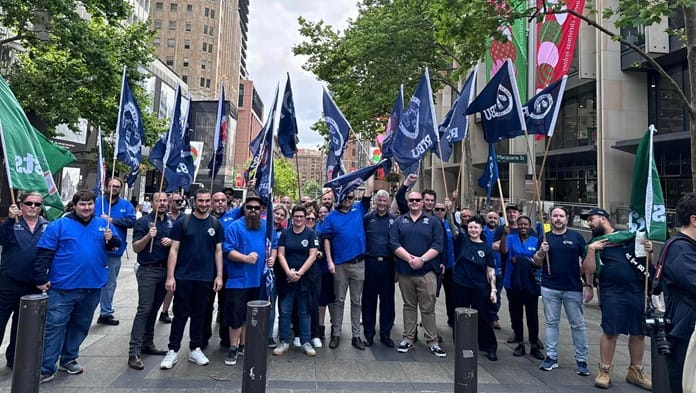Rail unions have once again lifted industrial bans in the face of legal action taken by the NSW Minns Labor government.
Bans such as kilometre limitations and signalling bans had threatened to disrupt New Year’s Eve celebrations in Sydney.
NSW police had flagged that they would recommend cancellation of the harbour bridge fireworks if the rail bans went ahead.
The government, backed by some employers (including hospitality company Merivale, waste company Veolia and agribusiness company Manildra) had banded together to seek an injunction in the Fair Work Commission prohibiting the unions’ bans.
Since June, the combined rail unions (RTBU, ETU, PA, AMWU, AWU) and the NSW government have been at loggerheads over pay and other conditions.
The rail unions are demanding a 8 per cent pay rise each year for four years. The NSW Labor government is insisting on its new informal pay cap of 4 per cent, 3 per cent, and 3 per cent, although the police were recently handed a 40 per cent pay rise over four years.
The Labor government is consistently resorting to court action and the threat of fines to prohibit industrial action.
An RTBU delegate told Solidarity, “The court action is a direct assault on our rights.”
Break the court shackles
Under section 424 of the Fair Work Act, employers can apply to the Fair Work Commission to suspend industrial action if it could cause significant damage to the Australian economy or an important part of it.
In other words, strike action can be banned if is too effective. The legal consequence of defying a ban is fines against the union.
But the law can be defied. Recently, 10,000 NSW nurses and midwives walked out against a court order banning their strike. CFMEU workers recently defied the Fair Work ruling that their one-day strike against administration was illegal. No action has been taken against the nurses or the CFMEU.
As RTBU delegate said, “Nothing just gets given to you; you have to fight for it. If they don’t want to pay us, then we withdraw our labour. That’s our power.”
Rail workers have consistently voted for industrial action. After court action stalled industrial action a week ago, rail workers voted in a new protected action ballot. The response was overwhelming.
Eighty-one per cent of union members on Sydney trains (covering Sydney metropolitan trains) and 78 per cent on NSW trains (covering intercity and regional services) voted Yes to all proposed industrial action.
Strike action can win
Hopes were high when a Minns Labor government replaced the Liberals in 2023 that things would be different. Public service workers had sacrificed their wages during COVID-19.
Minns said a Labor government would scrap the wage cap that had seen real wage cuts over the past few years. But any illusions in Labor are now fading fast.
An RTBU delegate told Solidarity, “After the last agreement union officials were pushing the line that next time it will be better because we will have a Labor government. Clearly, it’s not different.”
An ETU delegate similarly said, “The mood at the start of this bargaining period was that Labor is in power, it should be easy. But it doesn’t matter what government is in, we have to continue fighting back.”
In the latest ballot, rail workers have given their leadership a mandate to fight. As an RTBU delegate said, “The only thing that has an effect is a strike. That’s why members voted to do everything possible.”
But in the face of the threat that the Fair Work Commission would ban industrial action, the RTBU officials have backed down and suspended union industrial action until 6 January.
Suspending industrial action only gives the government breathing space and prolongs the inevitable showdown with the Minns government. A win for the rail workers will be a win for every worker facing the high costs of living.
In 2017 bus drivers gathered more than 500 RTBU members’ signatures demanding a meeting to discuss the “Don’t sell our buses” campaign, forcing the RTBU to call a special general meeting.
Rank-and-file action could again force a mass meeting to galvanise the willingness to fight and call the strike action that will be necessary to win the rail workers’ pay demand.
By Jayden Awarau






